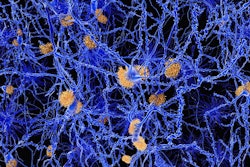
BALTIMORE - Researchers from the University of California, Los Angeles (UCLA) are adding to the evidence that amyloid PET imaging can be a valuable resource for diagnosing and treating Alzheimer's disease. They presented their findings on Monday at the Society of Nuclear Medicine and Molecular Imaging (SNMMI) annual meeting.
The researchers found that an amyloid PET scan acquired within a month of an inconclusive conventional FDG-PET scan provided a clearer diagnosis for patients with an Alzheimer's-like pattern of reduced brain metabolism. It also offered earlier, more effective treatment and a better chance to preserve cognitive function.
"Given that 17% of individuals with indeterminate FDG [PET] scans will benefit cognitively from receiving an amyloid [PET] scan, the study provides outcome-based evidence for a diagnostic decision at that point," lead author and research coordinator Erica Parker wrote in an email to AuntMinnie.com.
Related research
There is some precedence for advocating an amyloid PET scan in the wake of indeterminate FDG-PET results, according to Parker, who cited a July 2014 study in Alzheimer's & Dementia (Vol. 10:4, pp. 18-19).
Additionally, an interim analysis of the Metabolic Cerebral Imaging in Incipient Dementia (MCI-ID) trial at UCLA found that managing physicians who received FDG-PET scan results for patients with Alzheimer's disease were 40% more likely to prescribe medications appropriate for the condition within a year.
"These participants also had improved or stable cognitive capabilities compared to the participants with an Alzheimer's-like pattern of metabolism in their brain whose managing physicians did not receive the results of the scan," Parker said. "Clinical outcomes of patients who receive an amyloid scan after an indeterminate FDG-PET scan have yet to be determined."
In the results presented at SNMMI, FDG and amyloid PET data from 100 participants with mild cognitive impairment were evaluated independently in two blinded readings conducted by a radiologist and a nuclear medicine physician. Readings were documented as positive, negative, or indeterminate for neurodegenerative disease.
Of the patients whose readings were initially indeterminate, 82% experienced subsequent cognitive decline. Amyloid PET scans were found to be positive in 50% of cases that were inconclusive using FDG-PET alone.
Additional benefits
These results were then integrated with the Alzheimer's Disease Neuroimaging Initiative (ADNI), which found that Alzheimer's treatment was administered earlier for 40% of patients with positive FDG-PET scans. Subjects who began Alzheimer's treatment earlier had better cognitive outcomes.
"By combining data from ADNI and the MCI-ID trial, we found that 17% of patients who receive an amyloid imaging scan after an indeterminate FDG-PET scan will expect to have better clinical/cognitive outcomes," Parker said. "To date, no conclusive evidence has been produced about the use of amyloid [PET] imaging in this role. This study suggests that amyloid imaging should be considered after an inconclusive FDG scan is obtained."
Previous studies have confirmed that similar prognostic accuracy can be achieved for patients with ambiguous FDG-PET by repeating the scan after one year, Parker also noted; however, waiting for a year or more could lead to cognitive decline.
"By acquiring an amyloid imaging scan within a month of the indeterminate FDG-PET, managing physicians can treat patients with an Alzheimer’s-like pattern of reduced brain metabolism with a better chance of preserving cognitive function," she said.
While both FDG-PET and amyloid PET imaging are available to the public, amyloid PET is not currently reimbursed by Medicare.
Parker believes that amyloid PET imaging may become more widely used, given the clinical implications for patients with an indeterminate FDG-PET scan.
"Although the usefulness of amyloid imaging agents is being worked out, the results of this study provide a framework of one of the circumstances when amyloid imaging should be considered in order to improve patient's cognition," she said.




















